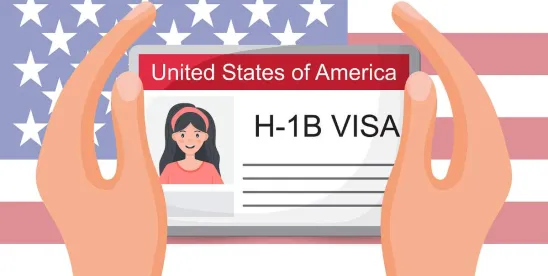While Fiscal Year 2025 just began Oct. 1 for employers, they should look ahead to Fiscal Year 2026’s H-1B season and its accompanying lottery as changes are on the horizon.
For those new to the H-1B lottery, the annual regular limitation for the allotment of visas in the H-1B category is 65,000, with an additional 20,000 H-1B visas available to graduates of U.S. master’s degree programs. Of the 65,000 H-1B visas allocated to the “regular cap,” 6,800 are set aside each fiscal year for the H-1B1 program designated for the temporarily employment of workers from Chile and Singapore), with any unused visas becoming available for H-1B use for the next fiscal year’s regular H-1B cap.
Lottery Registration Fees to Increase
Since the launch of the electronic H-1B registration system by U.S. Citizenship and Immigration Services (USCIS) in 2020, the fee per individual lottery registration has been $10. In Fiscal Year 2026, which will officially kick off with registration in March 2025, the fee will increase to $215.
The increase, aimed at deterring fraud and duplicative registrations, likely will prompt employers to be more selective with respect to H-1B candidates entered into the lottery in order to avoid the higher fees.
Potential H-1B Candidates
In preparation for the H-1B registration period, the best practice for employers is to review records of current and prospective non-U.S. workers to identify those eligible for H-1B status for FY 2026, which begins on Oct. 1, 2025. Such individuals include, but are not limited to:
- Students, recent hires, or paid interns who hold F-1 visa status and are working under Optional Practical Training (OPT) or STEM OPT employment authorization. Employers may also include incoming new hires who will otherwise be eligible for H-1B status based upon an anticipated degree completion date in spring 2025.
- Certain L-1 intracompany transferees who are limited by time restrictions in their respective L-1 category
- Prospective non-U.S. worker employees who qualify for H-1B status but have not previously held H-1B status
- Certain E-3 and H-1B1 visa holders and spouses in H-4, L-2, or E-2 status
Due to the changes to the electronic registration process, it is crucial employers begin to collect information on potential H-1B candidates for Fiscal Year 2026 as soon as possible. Thorough review and advance planning will position employers to make the most of the upcoming H-1B registration period.
This article was co-authored by Tieranny Cutler, independent contract attorney.




 />i
/>i
